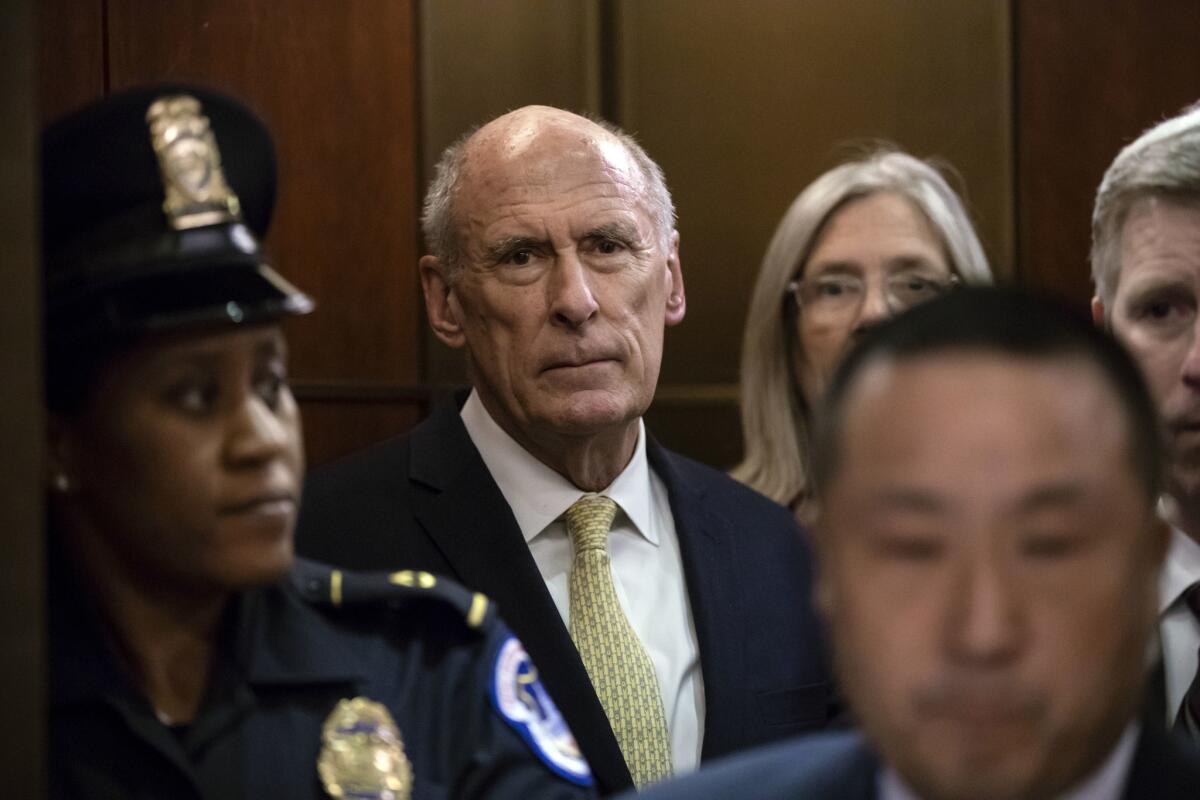Trump picks loyalist John Ratcliffe to replace Dan Coats as U.S. intelligence chief

WASHINGTON — President Trump said Sunday he was replacing Director of National Intelligence Dan Coats, whose views on the threat posed by Russia often conflicted with the president’s, with Rep. John Ratcliffe, a Texas Republican and Trump loyalist.
“I am pleased to announce that highly respected Congressman John Ratcliffe of Texas will be nominated by me to be the Director of National Intelligence,” Trump tweeted late in the afternoon, a few hours after news became public about a meeting last week between Coats and Trump that resulted in the decision to part ways.
Trump said Ratcliffe, 53, who was first elected to Congress in 2014, will “lead and inspire greatness for the Country he loves.”
Coats, he said, would step down on Aug. 15. Trump said he would soon name an acting director to run the national intelligence office while the Senate considers Ratcliffe’s nomination. By law, the director is the president’s top intelligence advisor, with a mandate to oversee the activities of the nation’s numerous intelligence agencies.
Coats, 76, a former U.S. senator from Indiana, personified a certain kind of Washington establishment figure who found it difficult — and ultimately impossible — to maintain a foothold in the Trump administration. He follows out the door a string of appointees including former Defense Secretary James N. Mattis, ex-national security advisor H.R. McMaster and former Secretary of State Rex Tillerson. All were lavishly lauded by Trump at first, only to see the relationship turn publicly sour as differing views on key issues became apparent.
The departure of Coats will complete the near-total turnover of Trump’s national security team since he took office. Mattis resigned as defense secretary late last year, nine months after Tillerson was pushed out as secretary of State. Michael R. Pompeo, Trump’s original CIA director, left that role to replace Tillerson. Gina Haspel, a career spy, now leads the CIA.
In his resignation letter, Coats said: “The intelligence community is stronger than ever, and increasingly well prepared to meet new challenges and opportunities. As we have previously discussed, I believe it is time for me to move on to the next chapter of my life.”
Trump and Coats have often found themselves at odds over Russia’s interference with the 2016 election, sometimes very publicly.
The president, seeing the issue as a threat to his legitimacy, has downplayed Moscow’s role at nearly every turn. Trump even sided with Russian President Vladimir Putin over U.S. intelligence agencies during the two leaders’ news conference in Helsinki, Finland, last year, a startling show of deference that was broadcast live around the world.
“My people came to me, Dan Coats came to me, and some others, they said they think it’s Russia,” Trump said. “I have President Putin. He just said it’s not Russia. I will say this, I don’t see any reason why it would be.”
That comment prompted Coats to issue an unusual public statement standing by the official analysis that Moscow meddled in the last presidential election.
The Trump-Coats dissonance over Russia yielded a memorable moment of live video in July 2018, when Coats was informed while onstage at the Aspen Security Forum that Trump had invited Putin to the White House — a meeting that ultimately didn’t come to pass.
“Say that again,” a surprised-sounding Coats blurted out, before adding wryly, “That is going to be special.”
Future Russian interference has also been a key issue. Coats said that the threat continues and that the country is “just one click of the keyboard away from a similar situation repeating itself.”
The next day, Trump made it clear he didn’t see eye to eye with him. “I don’t know if I agree with that,” he said then. “I’d have to look.”
The intelligence chief again broke with Trump during testimony before the Senate Intelligence Committee in January. He said he didn’t think North Korea would surrender its nuclear weapons, Islamic State was still a powerful presence in Syria and Iraq, and Iran wasn’t pursuing nuclear weapons yet — all positions the president has publicly disagreed with.
Tensions between Trump and Coats almost led the intelligence head to step down in March. Reports circulated that Vice President Mike Pence, a fellow Indiana Republican who was a protege of Coats, had to persuade the director not to retire after Trump’s December announcement that he would remove all troops from Syria. Troops remain in Syria.
Ratcliffe, by contrast, is a prominent critic of former special counsel Robert S. Mueller III and his investigation. He served on both the House Judiciary Committee and the House Intelligence Committee, giving him two opportunities to question Mueller last week.
A former federal prosecutor, Ratcliffe accused Mueller of overstepping his authority by declaring Trump was not exonerated of obstruction of justice.
“By doing that, you managed to violate every principle in the most sacred of traditions about prosecutors not offering extra-prosecutorial analysis about potential crimes that aren’t charged,” he said then.
In an interview aired on Fox News hours before Trump announced his selection, the Texas Republican blasted Democrats over inquiries into Russian interference and related matters, saying they unfairly targeted Trump.
“I think the first thing we need to do is make sure we don’t do what the Democrats have done,” Ratcliffe told the Fox program “Sunday Morning Futures.”
“They accused Donald Trump of a crime, and then they try and reverse-engineer a process to justify that accusation.”
He then turned the subject to “crimes committed during the Obama administration.”
Democrats, meanwhile, sought anew to raise alarms about Russian interference in the 2020 presidential vote. Speaking on NBC’s “Meet the Press,” Rep. Adam B. Schiff (D-Burbank) said Mueller’s testimony last week underscored the urgency of the threat.
“The special counsel confirmed the Russians have never stopped their interference,” said Schiff, who heads the House Intelligence Committee. “They’re at it again.”
Ratcliffe’s appointment comes at an important moment for matters related to Russia. With the special counsel investigation over, Atty. Gen. William Barr has been conducting a wide-ranging internal review of whether the case was handled appropriately. As part of that effort, Trump gave Barr additional authority to review and declassify classified material.
Ratcliffe could grease the wheels for that process at a time when Trump is eager to show that he and his campaign were treated unfairly.
Sen. Mark R. Warner of Virginia, the ranking Democrat on the Senate Intelligence Committee, praised Coats using language that could be interpreted as a veiled rebuke of Trump’s decision to replace Coats with a figure perceived as more malleable.
“The mission of the intelligence community is to speak truth to power,” Warner tweeted. “As DNI, Dan Coats stayed true to that mission.”
Staff writer Laura King contributed to this report.
More to Read
Get the L.A. Times Politics newsletter
Deeply reported insights into legislation, politics and policy from Sacramento, Washington and beyond. In your inbox three times per week.
You may occasionally receive promotional content from the Los Angeles Times.











